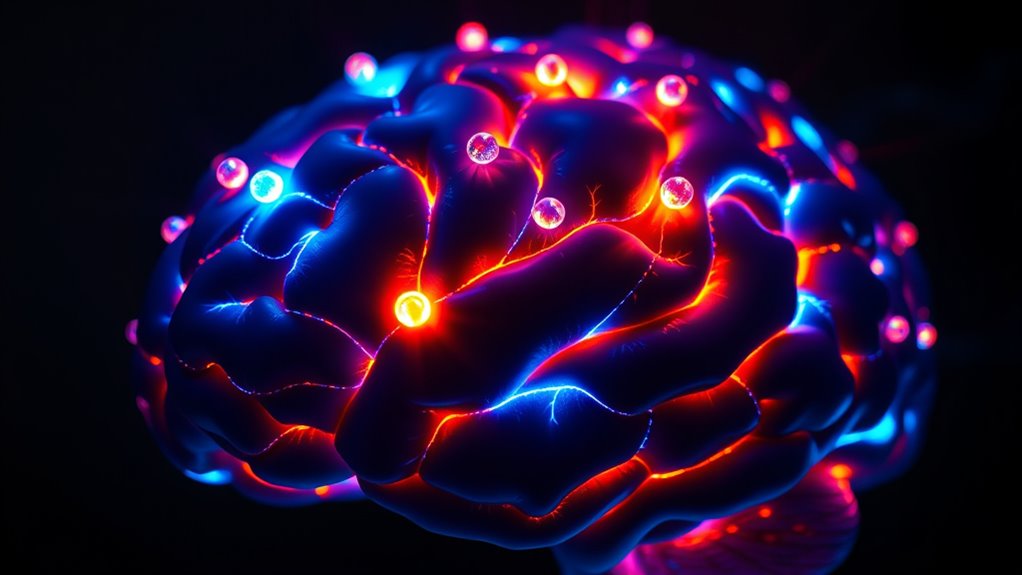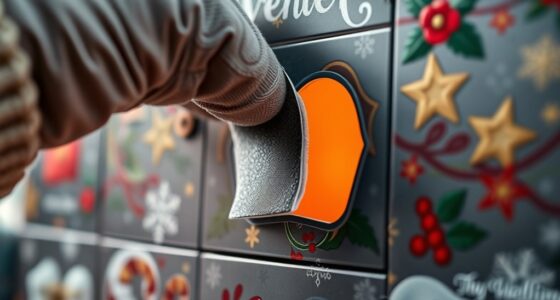When you give or receive a gift, your brain’s reward system activates, especially regions like the ventral striatum and VTA, releasing dopamine that boosts feelings of pleasure and connection. Surprises and anticipation can amplify these spikes, strengthening neural pathways linked to social bonding and happiness. Cultural norms also shape how your brain responds to gifts. To explore the fascinating neural mechanics behind these joyful bursts, keep exploring what neuroscience has uncovered about gift-induced dopamine spikes.
Key Takeaways
- Gift-giving activates brain regions like the ventral striatum and prefrontal cortex, triggering dopamine release associated with reward and pleasure.
- Anticipation and surprise during gift exchange cause dopamine spikes, reinforcing positive social and emotional responses.
- Sensory elements and thoughtful presentation enhance dopamine responses, amplifying the reward experience during gift interactions.
- Neural pathways involved in social bonding, such as mirror neurons and oxytocin release, are stimulated, strengthening emotional connections.
- Cultural norms influence neural reward activation, shaping individual dopamine responses to gift-giving experiences.
The Role of Dopamine in Human Pleasure

Dopamine plays a central role in how humans experience pleasure, acting as a key chemical messenger in the brain’s reward system. When you anticipate or encounter something rewarding, dopamine levels spike, reinforcing behaviors that bring joy. Over time, these dopamine responses can lead to neuroplasticity effects, where your brain adapts and strengthens neural pathways related to pleasure. Variations in dopamine receptors among individuals influence how intensely you feel these rewards, meaning some people experience heightened or diminished pleasure responses. Your receptor variation impacts how dopamine signals are received, shaping your overall experience of reward and motivation. Additionally, individual differences in dopamine receptor sensitivity can explain why different people respond uniquely to similar stimuli, including gifts or activities. Understanding the diversity of dopamine responses helps explain why certain activities or gifts evoke stronger feelings of pleasure, highlighting dopamine’s essential role in shaping your emotional responses. Recognizing how dopamine receptor variability influences pleasure can also inform approaches to enhance motivation and well-being through personalized experiences.
How Gift-Giving Activates the Brain’s Reward System

When you give a gift, your brain’s reward system kicks into gear, activating neural circuits associated with pleasure. This process triggers a surge of dopamine, reinforcing the positive feelings linked to generosity. As a result, gift-giving strengthens emotional bonds and makes the experience even more rewarding.
Neural Reward Activation
Gift-giving triggers a remarkable activation of the brain’s reward system, reinforcing feelings of happiness and satisfaction. When you give or receive a gift, it stimulates your reward circuitry, particularly areas like the ventral striatum and prefrontal cortex. This activation isn’t static; it promotes neural plasticity—your brain’s ability to adapt and strengthen these reward pathways over time. As you experience positive gift interactions, these neural connections become more efficient, making future acts of giving or receiving even more rewarding. This neural reward activation not only boosts your mood in the moment but also helps reinforce prosocial behaviors, encouraging you to seek out meaningful connections through gift exchanges. Additionally, understanding how neural plasticity influences reward pathways can shed light on how repeated positive social interactions strengthen emotional bonds over time. Recognizing these neural mechanisms highlights the importance of social rewards in fostering long-term relationship satisfaction.
Dopamine Release Dynamics
Engaging in the act of giving or receiving a gift triggers a rapid release of dopamine in your brain’s reward circuits, creating a powerful feeling of pleasure and anticipation. This surge enhances neural plasticity, allowing your brain to adapt and strengthen pathways associated with positive social interactions. During this process, synaptic transmission intensifies, facilitating faster communication between neurons involved in reward processing. Additionally, the variety of materials available for gifts can influence the intensity of this dopamine response by augmenting the sensory experience. Properly chosen essential oils can also enhance the sensory and emotional aspects of gift-giving, further stimulating dopamine release. The design and presentation of a gift can also amplify the emotional impact, making the experience even more rewarding.
Emotional Connection Enhancement
Participating in the act of giving or receiving a gift directly activates your brain’s reward system, strengthening emotional bonds. This process enhances emotional resonance, making both giver and receiver feel more connected. When you give a thoughtful gift, it triggers a psychological impact that fosters trust and intimacy, deepening your relationship. The brain associates gift exchanges with positive feelings, reinforcing the emotional significance of your connection. This activation of the reward system not only sparks dopamine spikes but also creates a sense of mutual appreciation. As a result, your emotional attachment becomes more profound, making interactions more meaningful. Additionally, understanding aura variations can provide insights into emotional states and deepen personal connections. Research also shows that dopamine release during gift-giving plays a crucial role in reinforcing these bonds, highlighting the neurochemical basis of emotional closeness. Moreover, neurotransmitter activity during these exchanges can influence mood and social behavior, further strengthening bonds. Ultimately, gift-giving becomes a powerful tool to strengthen bonds by tapping into your brain’s natural mechanisms for fostering emotional closeness.
The Neural Pathways Involved in Receiving Gifts
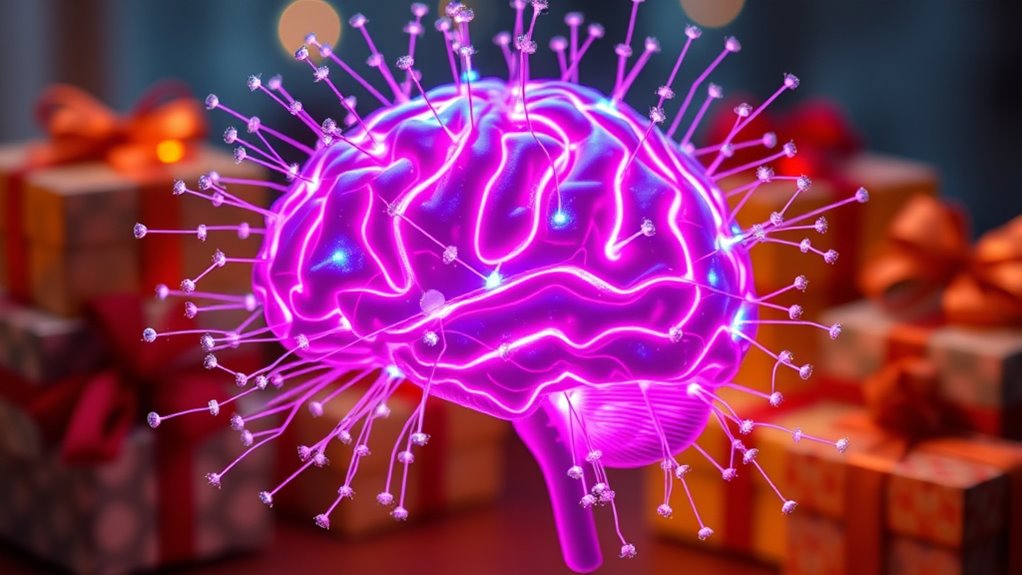
When you receive a gift, your brain’s reward circuit lights up, reinforcing positive feelings. This activation involves pathways like the nucleus accumbens and ventral tegmental area, which process pleasure and motivation. Additionally, oxytocin is released, strengthening feelings of trust and social bonding. Engaging in aquatic exercise can also stimulate the release of endorphins, further enhancing your mood and emotional well-being. The release of essential oils with calming properties, such as lavender or eucalyptus, can also help promote relaxation and emotional balance during social interactions. Moreover, understanding the role of cookies in website performance can improve your online experience when exploring related topics.
Reward Circuit Activation
Receiving a gift triggers activation of the brain’s reward circuit, involving key neural pathways that reinforce feelings of pleasure and motivation. When you receive a gift, your brain rapidly updates its reward prediction, signaling that a positive outcome has occurred. This process promotes neural plasticity, strengthening the connections within these pathways, so future similar experiences become more rewarding. The ventral tegmental area (VTA) and nucleus accumbens play central roles, releasing dopamine to reinforce the behavior. As your brain anticipates future rewards, these pathways adapt, making gift-giving and receiving more gratifying over time. This neural plasticity helps shape your emotional responses, ensuring that positive social interactions, like receiving gifts, continue to motivate and energize you. Additionally, the use of expert voice actors in storytelling enhances the emotional impact of these experiences, making the neural response even more profound.
Oxytocin Release Mechanisms
The act of receiving a gift activates specific neural pathways that promote the release of oxytocin, often called the “bonding hormone.” These pathways primarily involve the paraventricular nucleus (PVN) of the hypothalamus, which synthesizes oxytocin, and the surrounding limbic system structures, such as the amygdala and ventral tegmental area (VTA). Olfactory pathways also play a role, especially when scent cues trigger emotional responses linked to the gift. Additionally, mirror neuron activation occurs as you observe the giver’s intentions, fostering empathy and connection. These combined mechanisms facilitate oxytocin release, deepening feelings of trust and attachment during gift reception. Forsale 100 These intricate neural interplay reinforce social bonds and enhance emotional closeness, with recent studies highlighting the significance of neural pathways in understanding emotional responses. Furthermore, the engagement of reward circuits during positive social interactions amplifies the emotional impact of gift-giving.
The Impact of Surprise on Dopamine Release

Surprise plays a crucial role in shaping dopamine release by creating unexpected positive events that activate the brain’s reward system. When you experience surprise, it triggers anticipation effects, heightening your brain’s response. This surprise modulation amplifies dopamine spikes beyond what you’d feel from expected rewards. Here’s how it works:
Surprise boosts dopamine by triggering anticipation and activating the brain’s reward system.
- You don’t see the surprise coming, increasing its impact.
- The element of unpredictability makes the reward more memorable.
- Your brain releases more dopamine due to the heightened anticipation effects.
- The type of reward, such as a gift or achievement, can influence the magnitude of the dopamine response, especially when paired with electric bikes or other exciting experiences.
- Incorporating mindfulness techniques can enhance your awareness of these rewarding moments, boosting your overall sense of well-being. Recognizing the neural mechanisms behind surprise can help you intentionally incorporate more unexpected delights into your life.
Comparing Giving and Receiving: Different Neural Responses
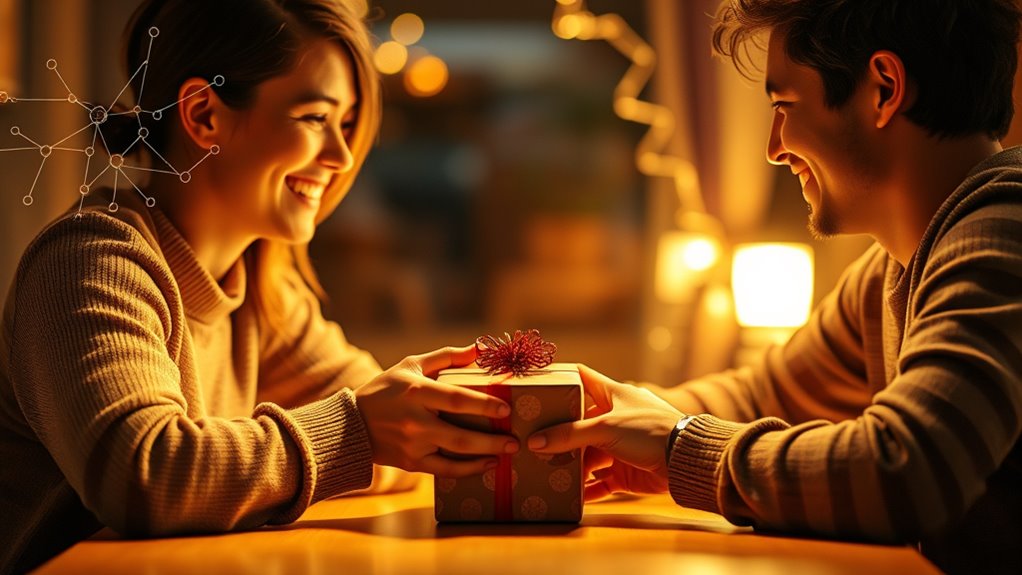
When you give a gift, your brain activates different neural pathways than when you receive one, reflecting distinct emotional and cognitive processes. Giving triggers neural adaptation, where your brain responds to the act of generosity and the meaning behind the gift, often linked to gift symbolism. This process engages areas associated with social cognition and reward, emphasizing the importance of the gesture itself. In contrast, receiving a gift activates neural circuits related to anticipation, reward, and gratitude. These responses highlight how giving is more about expressing intentions and social bonds, while receiving is focused on the emotional impact and personal value. Understanding these neural differences helps clarify why both acts feel uniquely rewarding, yet engage separate brain mechanisms. Holistic approach to family well-being also influences how these neural responses are experienced and appreciated.
The Influence of Social Connection on Dopamine Levels

When you connect with others, your brain releases more dopamine, making social bonds feel rewarding. Sharing experiences with friends or loved ones heightens this effect, amplifying feelings of pleasure. These social interactions boost your brain’s reward system, encouraging continued connection and closeness. Incorporating mindful awareness during these interactions can further deepen the sense of social presence and emotional connection. Additionally, engaging in activities like Volkswagen Tuning that involve skill development and personalization can also stimulate dopamine release, enhancing overall satisfaction and motivation.
Social Bonds Boost Dopamine
Social bonds play a crucial role in elevating dopamine levels, reinforcing feelings of pleasure and connection. When you engage genuinely with others, your brain’s neural plasticity adapts, strengthening pathways tied to social rewards. This process boosts your ability to develop cognitive empathy, helping you understand and share others’ feelings. As a result, social interactions become more rewarding. Here are three ways social bonds enhance dopamine:
- Sharing positive experiences creates a feedback loop, increasing dopamine release.
- Building trust and intimacy deepens neural connections, reinforcing social pleasure.
- Supporting others activates reward circuits, making social bonds more fulfilling.
Shared Experiences Enhance Reward
Shared experiences activate your brain’s reward system by creating meaningful moments that foster connection. When you share an activity with others, emotional contagion spreads, making both of you feel happier and more engaged. This shared emotional state enhances neural empathy, allowing you to better understand and resonate with each other’s feelings. As a result, dopamine levels spike, reinforcing the positive bond formed during the experience. These heightened neural responses deepen your sense of belonging and trust, making the reward even more significant. By engaging in shared moments, you not only enjoy immediate pleasure but also strengthen social ties that sustain long-term well-being. Ultimately, social connections amplify the brain’s reward signals, turning simple interactions into powerful triggers for dopamine release.
The Effect of Anticipation and Expectation in Gift-Giving

Anticipation and expectation play a crucial role in shaping our emotional response to gift-giving, often amplifying the thrill before the actual reveal. These anticipation effects heighten dopamine release, making the experience more rewarding. Your expectation influence can boost excitement, as you imagine the gift’s potential and the giver’s thoughtfulness.
Consider these points:
- The more you anticipate, the stronger your dopamine spike, intensifying your joy.
- Expectation effects can sometimes create disappointment if reality doesn’t match your mental image.
- Managing expectations helps you enjoy the gift more, reducing potential letdowns.
Cultural Factors and Neural Responses to Gifts

Cultural factors deeply influence how your brain responds to gifts, shaping both your expectations and emotional reactions. Cultural traditions set the stage for how you interpret gift-giving, affecting the neural response linked to reward and social bonding. In some cultures, gift symbolism plays an essential role, with specific items representing values, respect, or social status. When you receive a culturally significant gift, your brain may activate regions associated with emotional processing and reward more strongly, intensifying your dopamine response. Conversely, if a gift conflicts with cultural norms or expectations, your neural response might diminish, reducing feelings of pleasure. Understanding these cultural influences helps explain why identical gifts can evoke vastly different neural and emotional reactions across societies.
Practical Implications for Enhancing Happiness Through Giving

Understanding how cultural influences shape neural responses to gifts offers valuable insights into boosting happiness through giving. To maximize your gift-giving impact, focus on practices such as:
- Practice mindful giving—pay attention to the recipient’s preferences and the meaning behind your gift, enhancing the dopamine spike.
- Cultivate altruistic motivation—give without expecting anything in return, which deepens emotional satisfaction and neural reward.
- Focus on quality over quantity—meaningful, thoughtful gifts create stronger neural responses than numerous superficial ones.
Future Directions in Neuroscience Research on Generosity
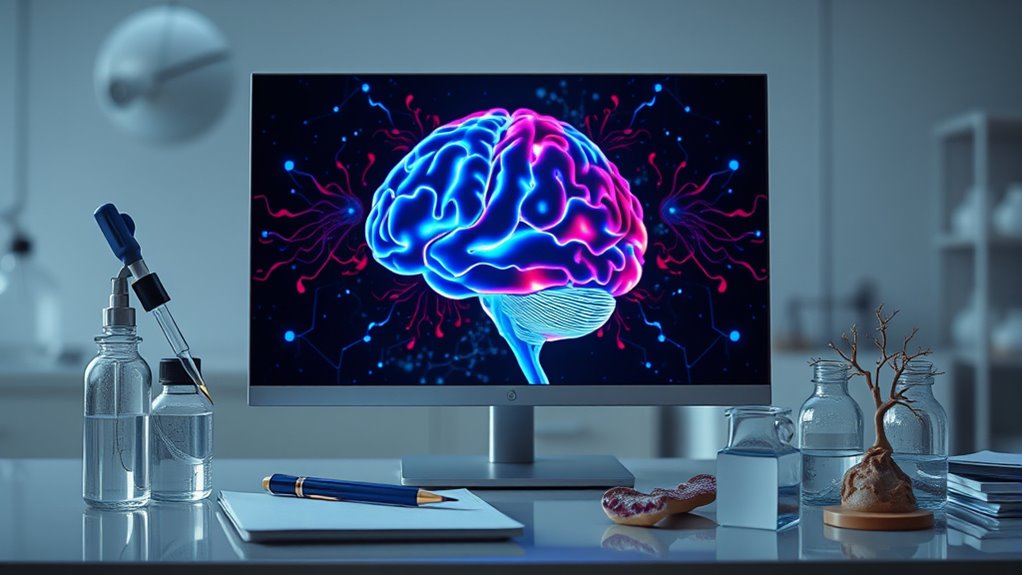
Advancements in neuroimaging and computational modeling are paving the way for more precise insights into how generosity activates the brain’s reward systems. These neural imaging advancements allow you to observe real-time brain activity, revealing neuroplasticity effects associated with giving behaviors. Future research can explore how repeated acts of generosity reshape neural pathways over time, strengthening the neural circuits linked to empathy and reward. By integrating sophisticated imaging techniques with computational models, you’ll gain a deeper understanding of the dynamic processes underlying prosocial decision-making. This approach could uncover how individual differences influence generosity’s neural mechanisms and inform interventions to foster more compassionate behaviors. Ultimately, these future directions promise to deepen your understanding of the neurobiological basis of generosity, opening new avenues for enhancing well-being through targeted neural modulation.
Frequently Asked Questions
How Do Individual Differences Affect Dopamine Responses to Gift-Giving?
Your individual differences, like personality variation and cultural influences, shape how your dopamine responds to gift-giving. If you’re more extroverted or value social bonds highly, you might experience stronger dopamine spikes when receiving a gift. Cultural norms also play a role—some cultures emphasize the significance of giving and receiving, boosting your emotional and neurochemical response. Understanding these factors helps explain why gift-giving feels uniquely rewarding for everyone.
Are There Long-Term Neural Changes From Regular Gift-Giving Behavior?
They say “practice makes perfect,” and that’s true for your brain too. Regular gift-giving can lead to neuroplasticity effects, where your reward system adapts over time. These long-term neural changes might enhance your capacity for generosity or strengthen your social bonds. So, yes, consistent giving can shape your brain’s wiring, making it more responsive to social rewards and fostering deeper connections through reward system adaptations.
How Does Age Influence Dopamine Spikes During Gift Exchanges?
Age influences dopamine spikes during gift exchanges through changes in neurochemical mechanisms and age-related neural plasticity. As you age, your brain’s response to rewarding stimuli like gift-giving may diminish or alter, affecting dopamine release. Younger individuals often experience stronger dopamine spikes due to higher neurochemical activity, while older adults might have reduced responses. These shifts reflect the brain’s adaptation over time, shaping how you experience and value gift exchanges.
Can Artificial or Virtual Gifts Evoke Similar Neural Responses?
Imagine opening your phone to find a virtual gift—suddenly, you feel that familiar rush. Virtual gift effects can trigger artificial reward responses, activating similar neural pathways as physical gifts. While these digital tokens may not produce the same dopamine spike intensity, they still tap into your brain’s reward system, making you feel appreciated and connected. So yes, artificial or virtual gifts can evoke comparable, if milder, neural responses.
What Role Do Personality Traits Play in Gift-Induced Dopamine Release?
You might notice that your personality traits influence how you respond to gifts, especially in regards to dopamine release. If you’re high in agreeableness or openness, you tend to experience greater emotional regulation, making gift-giving more rewarding and boosting dopamine. Conversely, traits like neuroticism can dampen this response. Your unique personality shapes your emotional regulation, which in turn impacts the neural response to receiving or giving gifts.
Conclusion
By understanding how gift-giving sparks dopamine release, you can harness this knowledge to boost your happiness and strengthen relationships. Did you know that giving activates the same brain regions as drug rewards? So, next time you surprise someone, remember you’re not just sharing a gift—you’re triggering a powerful neural response that benefits both you and the recipient. Embrace giving, and experience the joyful neuroscience behind it.
